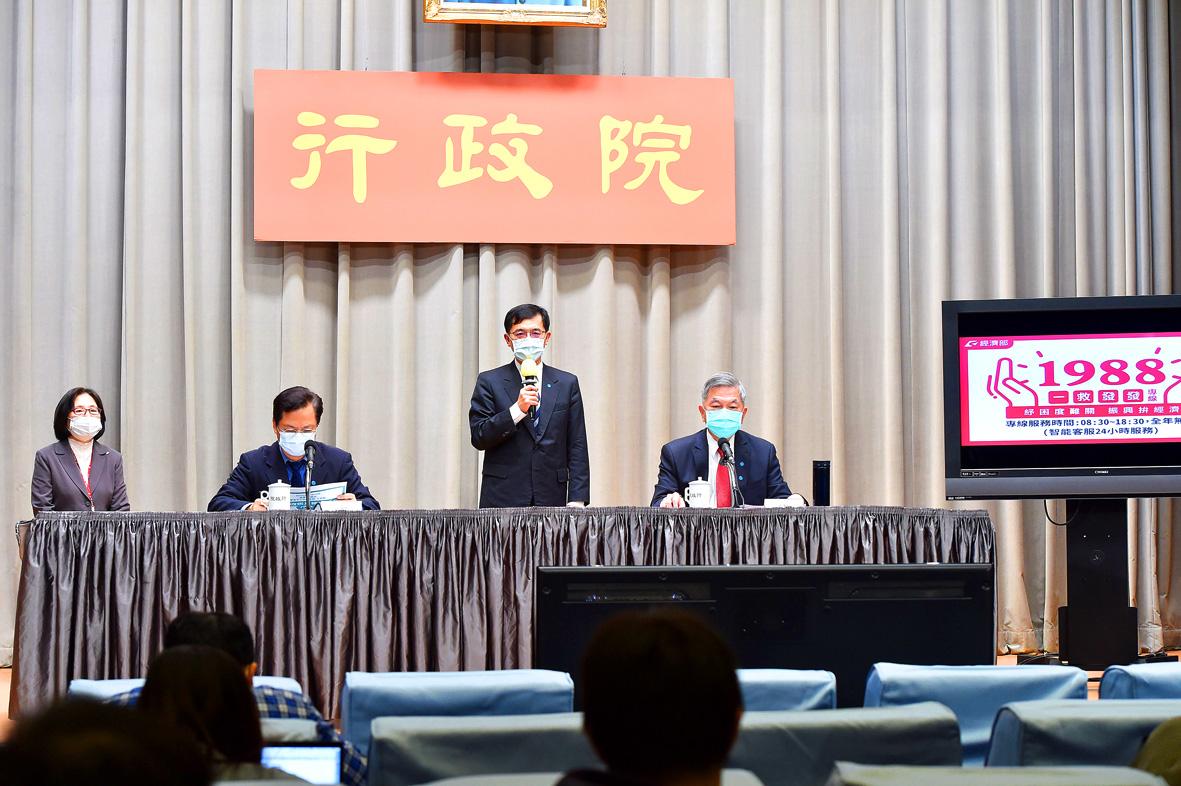The Ministry of Economic Affairs yesterday unveiled details about subsidy programs for the service sector amid a downturn due to the COVID-19 pandemic.
Subsidies would be issued for payroll and overhead costs for businesses whose income has dropped by at least 50 percent, Minister of Economic Affairs Shen Jong-chin (沈榮津) told a news conference at the Executive Yuan in Taipei.
Subsidies would be 40 percent of each employee’s monthly salary, but not more than NT$20,000 (US$664), and would be paid from this month to June, Shen said.

Photo: CNA
Overhead subsidies for firms would be NT$10,000 per employee, he said.
Retailers, wholesalers, restaurants, warehouses, karaoke bars, laundromats, photography studios, bridal shops, barbers and beauty parlors are among the firms that can apply for the funds, he said.
To apply, an employer must not have laid off or furloughed any workers, or cut their salaries by more than 20 percent, he said.
The ministry also announced a plan to dispatch 250 financial consultants to the nation’s 221 shopping districts and 401 night markets to assist vendors to apply for loans to mitigate negative economic effects amid the pandemic.
As small and medium-sized enterprises (SME) need proof that their income has been reduced by at least 15 percent to secure special government loans, night market vendors and small stores exempted from providing receipts might find it dfficult to apply, Minister Without Portfolio Kung Ming-hsin (龔明鑫) said.
To assist small businesses to secure loans, the ministry would send financial consultants to understand their situations and help prove that their operations have been affected, Small and Medium Enterprise Administration Director-General Ho Chin-tsang (何晉滄) said.
The consultants would include professionals from the eight major state-run banks, the Certified Public Accountant Associations of the Republic of China (Taiwan) and retired bank employees, Ho said.
The SME agency helped a business with 16 employees and 11 stalls in Taipei secure a loan of NT$5 million, he said.
Consultants determined from its invoices and balance sheets that its operations had suffered due to the pandemic, he said.
From March 16 to Thursday, 921 SMEs, medical facilities, transportation firms, hotels, travel agencies, recreational facilities, performance venues and movie theaters had secured a combined NT$10.1 billion in special loans, Kung said.
Authorities were still reviewing applications from another 514 establishments for a combined NT$3.94 billion in loans, he said.
As loans for an SME are capped at NT$20 million, state-owned banks have offered larger loans to businesses that need more than government agencies can give them, Kung said.
As of Thursday, state-owned banks have loaned a combined NT$25.29 billion to 1,380 businesses and NT$8.09 billion to 903 individuals, he said.

US climber Alex Honnold is to attempt to scale Taipei 101 without a rope and harness in a live Netflix special on Jan. 24, the streaming platform announced on Wednesday. Accounting for the time difference, the two-hour broadcast of Honnold’s climb, called Skyscraper Live, is to air on Jan. 23 in the US, Netflix said in a statement. Honnold, 40, was the first person ever to free solo climb the 900m El Capitan rock formation in Yosemite National Park — a feat that was recorded and later made into the 2018 documentary film Free Solo. Netflix previewed Skyscraper Live in October, after videos

Starting on Jan. 1, YouBike riders must have insurance to use the service, and a six-month trial of NT$5 coupons under certain conditions would be implemented to balance bike shortages, a joint statement from transportation departments across Taipei, New Taipei City and Taoyuan announced yesterday. The rental bike system operator said that coupons would be offered to riders to rent bikes from full stations, for riders who take out an electric-assisted bike from a full station, and for riders who return a bike to an empty station. All riders with YouBike accounts are automatically eligible for the program, and each membership account

A classified Pentagon-produced, multiyear assessment — the Overmatch brief — highlighted unreported Chinese capabilities to destroy US military assets and identified US supply chain choke points, painting a disturbing picture of waning US military might, a New York Times editorial published on Monday said. US Secretary of Defense Pete Hegseth’s comments in November last year that “we lose every time” in Pentagon-conducted war games pitting the US against China further highlighted the uncertainty about the US’ capability to intervene in the event of a Chinese invasion of Taiwan. “It shows the Pentagon’s overreliance on expensive, vulnerable weapons as adversaries field cheap, technologically

NUMBERs IMBALANCE: More than 4 million Taiwanese have visited China this year, while only about half a million Chinese have visited here Beijing has yet to respond to Taiwan’s requests for negotiation over matters related to the recovery of cross-strait tourism, the Tourism Administration said yesterday. Taiwan’s tourism authority issued the statement after Chinese-language daily the China Times reported yesterday that the government’s policy of banning group tours to China does not stop Taiwanese from visiting the country. As of October, more than 4.2 million had traveled to China this year, exceeding last year. Beijing estimated the number of Taiwanese tourists in China could reach 4.5 million this year. By contrast, only 500,000 Chinese tourists are expected in Taiwan, the report said. The report